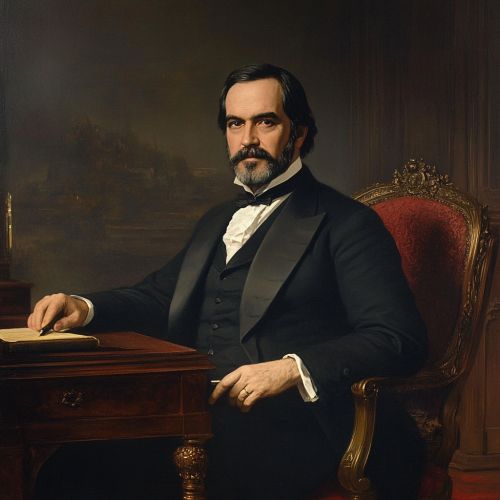John Peter Altgeld
Early Life and Education
John Peter Altgeld was born on December 30, 1847, in Nieder Selters, Duchy of Nassau, which is now part of Germany. His family emigrated to the United States when he was just a few months old, settling in Ohio. Altgeld grew up in poverty, working on his family's farm and receiving a limited formal education. Despite these challenges, he was an avid reader and self-educated himself in various subjects, including law.
Military Service
During the American Civil War, Altgeld enlisted in the Union Army at the age of 16. He served in the 164th Ohio Infantry Regiment, participating in several key battles. His military service was cut short due to illness, and he was honorably discharged in 1864. This experience left a lasting impact on him, shaping his views on social justice and governance.
Legal Career
After the war, Altgeld pursued a career in law. He studied under a local attorney in Ohio before moving to Savannah, Missouri, where he was admitted to the bar in 1869. His legal career began modestly, but he quickly gained a reputation for his intelligence and dedication. In 1875, he moved to Chicago, Illinois, where he continued to practice law and became involved in local politics.
Political Career
Early Political Involvement
Altgeld's political career began in earnest when he was elected as a judge of the Superior Court of Cook County in 1886. His tenure was marked by his progressive views and efforts to reform the judicial system. He was a vocal critic of corruption and advocated for the rights of workers and the poor.
Governorship
In 1892, Altgeld was elected as the 20th Governor of Illinois, running as a Democrat. His term in office was notable for several significant actions and policies. One of his most controversial decisions was the pardon of the remaining Haymarket Affair defendants in 1893. Altgeld believed that the trial had been unfair and that the men had been wrongfully convicted. This decision was met with both praise and severe criticism, solidifying his reputation as a progressive reformer.


Labor Reforms
Altgeld was a strong advocate for labor rights. During his tenure, he signed several pieces of legislation aimed at improving working conditions, including laws that restricted child labor, mandated safety regulations in factories, and limited the working hours for women. He also supported the establishment of the Illinois Bureau of Labor Statistics to monitor and report on labor conditions in the state.
Pullman Strike
One of the most significant events during Altgeld's governorship was the Pullman Strike of 1894. The strike, led by the American Railway Union, disrupted rail traffic nationwide. Altgeld opposed the use of federal troops to break the strike, arguing that it was a state matter and that the intervention was unconstitutional. Despite his objections, President Grover Cleveland sent federal troops to quell the strike, leading to violent clashes and numerous casualties.
Later Life and Legacy
After losing his bid for re-election in 1896, Altgeld returned to his legal practice in Chicago. He continued to be an outspoken advocate for social justice and progressive reforms until his death on March 12, 1902. Altgeld's legacy is complex; he is remembered as a champion of labor rights and social justice, but also as a controversial figure whose decisions often put him at odds with powerful interests.
